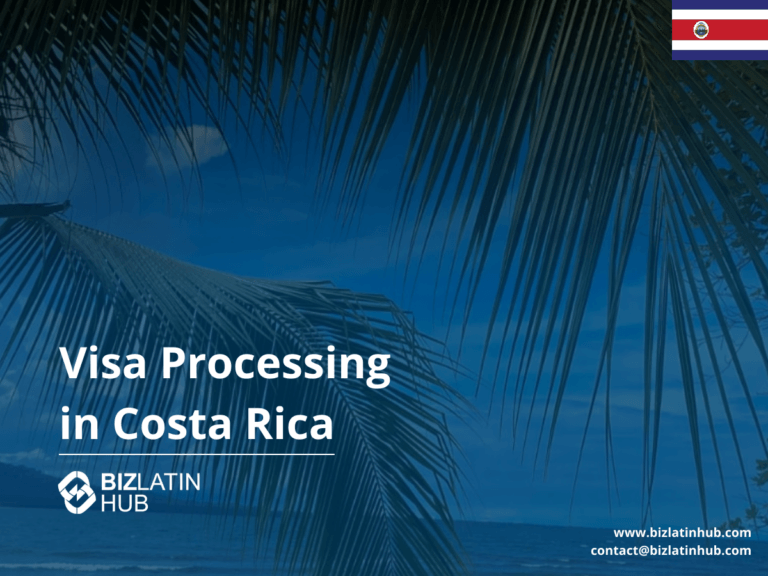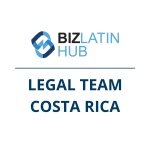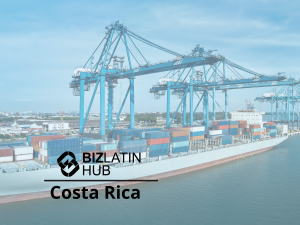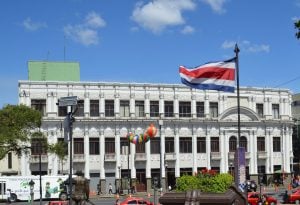Obtaining an investor visa for Costa Rica allows you to reside and work permanently in this Central American nation, making it an attractive option for foreigners interested in taking advantage of the country’s strong economy. If you are considering starting a business in Costa Rica or investing in its import/export or real estate sectors, obtaining an investor visa for Costa Rica is a crucial step in facilitating your plans and ensuring legal compliance. This guide details the minimum investment options, the required documentation, and the step-by-step process for securing temporary residency as an investor in Costa Rica.
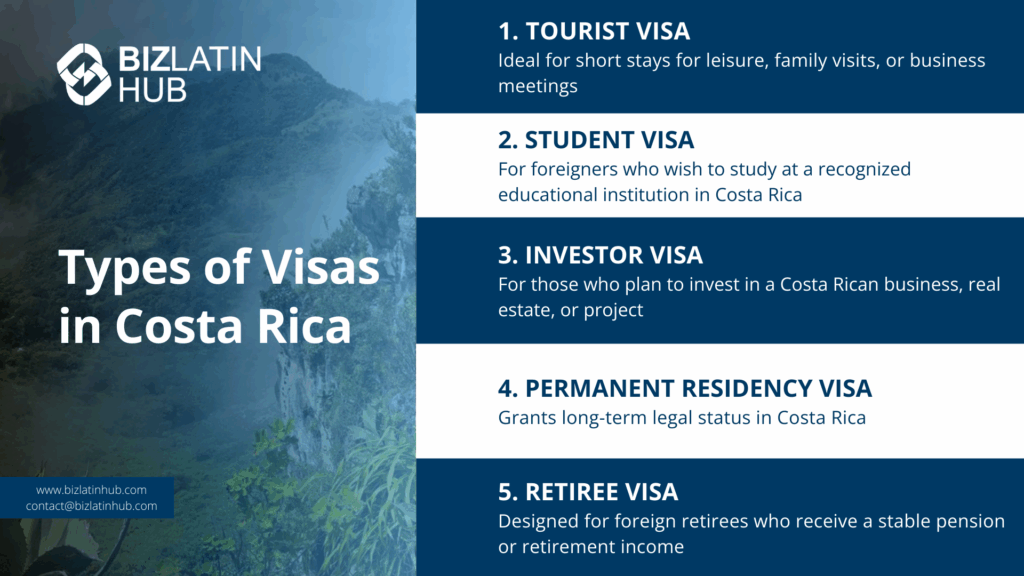
Key Takeaways: Costa Rica Investor Visa (Inversionista)
| What is the minimum investment required for the investor visa? | USD $150,000 (as of Law 9996, 2021) in real estate, business, securities, or USD $100,000 in forestry. The investment can be in real estate, vehicles, shares, or a productive project. |
| Golden Visa Type | The visa grants temporary residency for two years, with the option to renew. |
| Processing Time | 90 days for application review, 3-6 months total including documentation |
| Residency Requirements | Minimum 1 day per year in Costa Rica to maintain status |
| Path to Permanent Residency | After three years, a temporary resident can apply for permanent residency. |
| Path to Citizenship | After 7 years (5 years for certain nationalities), plus Spanish language and civics exams |
| CAJA Social Security | Mandatory enrollment, approximately USD $125-300/month based on declared income |
| Tax Benefits | Territorial tax system – no taxes on foreign-sourced income |
| Family Inclusion | Spouse and children under 25 can be included |
| Due Diligence Period | Enhanced background checks required, including apostilled criminal records |
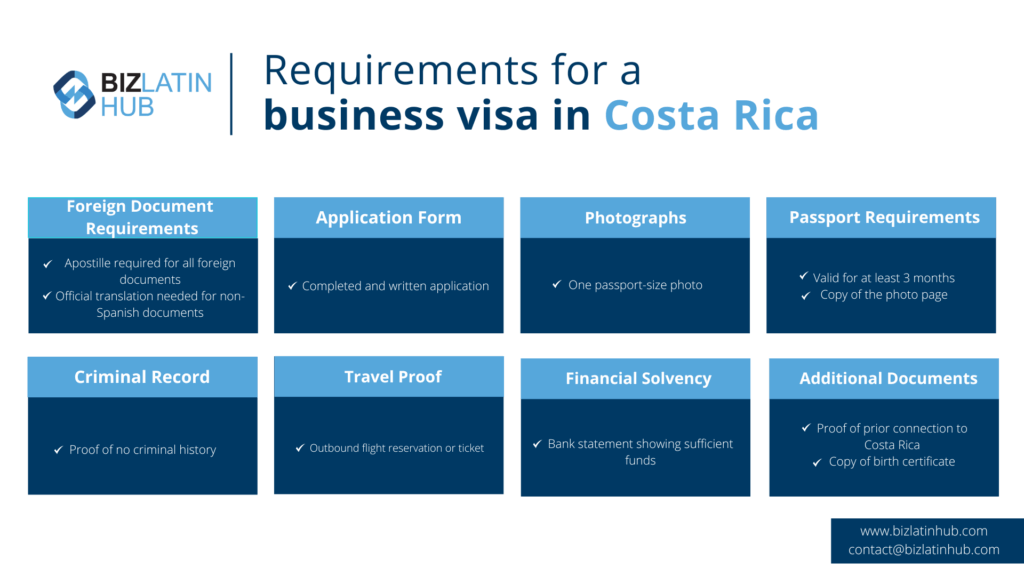
Investment Requirements for the Investor Visa
Anyone interested in getting an investor visa for Costa Rica must meet the following requirements:
- Make a minimum investment of $150,000 (USD), after the Costa Rican government slashed the minimum investment needed in August 2021.
Typical paperwork and documentation required for obtaining an investor visa include:
A marriage certificate if applicable
A 2×2 inch headshot of yourself
The receipt of payment of applicable fees
Your passport
A record of your fingerprints
A copy of your birth certificate
The 5-Step Application Process
To obtain an Investor Visa in Costa Rica, follow the steps below.
Expert Tip: The Importance of Registering the Investment
From our experience, a critical step that is often misunderstood is the need to properly document and register your investment. It is not enough to simply buy a property or shares. The investment must be officially registered and traceable. For a real estate investment, this means ensuring the property is registered in your name in the National Registry (Registro Nacional) with the correct declared value.
For an investment in a company, it must be properly documented through shareholder agreements and financial records. The DGME will meticulously verify that the investment is legitimate and meets the minimum threshold, so clear and official documentation is essential for a successful application.
Step 1: Make the Qualifying Investment
You must complete your investment of at least USD $150,000 in an approved category, such as real estate or a business.
Step 2: Gather and Apostille All Documents
Collect all personal documents, such as your birth certificate and a criminal record check, and have them apostilled in your home country.
Step 3: Register Fingerprints in Costa Rica
You must visit Costa Rica to have your fingerprints registered with the Ministry of Public Security.
Step 4: Submit the Application to the DGME
The formal application, along with all supporting personal and investment documents, is submitted to the General Directorate of Migration and Foreigners (DGME).
Step 5: Obtain Your Residency Card (DIMEX)
Once your residency is approved, you must register with the Costa Rican Social Security Fund (CCSS) and then process the final issuance of your DIMEX card.
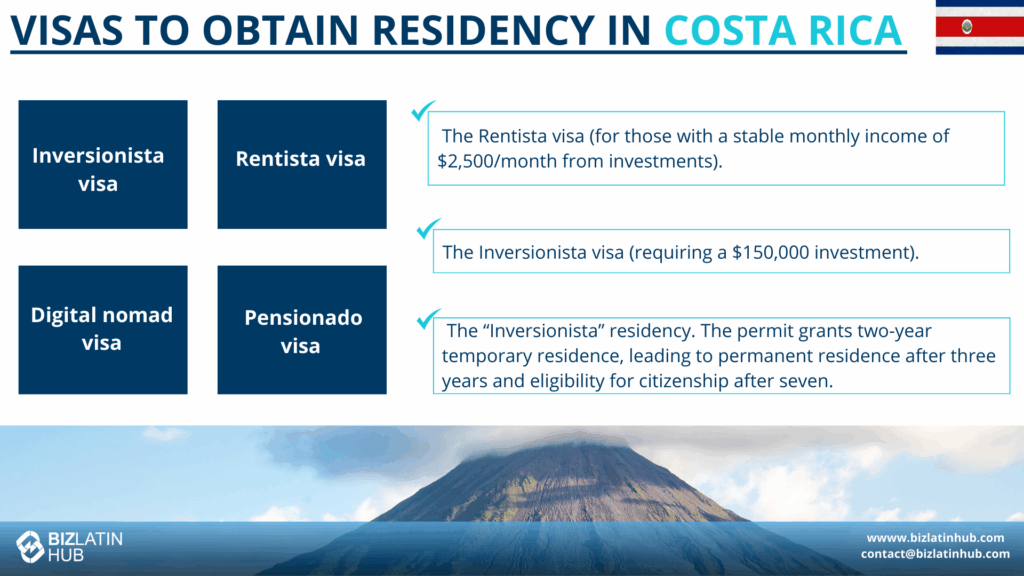
Costa Rica Investor Visa Processing Times
Application Timeline
- Document preparation: 4-6 weeks
- Consular submission: 2-4 weeks
- DGME review: 90 days (official timeframe)
- CAJA registration: 2-3 weeks
- Total process: 3-6 months
Factors Affecting Processing Speed
- Document authentication delays
- Incomplete application submissions
- CAJA interview scheduling
- Investment verification requirements
Governing Body: The DGME
The General Directorate of Migration and Foreigners (Dirección General de Migración y Extranjería – DGME) is the government entity in Costa Rica responsible for all immigration matters. All applications for residency, including the investor visa, are processed and approved by the DGME.
Mandatory CAJA Social Security Registration
All Costa Rica investor visa holders must enroll in the Caja Costarricense de Seguro Social (CAJA), the national social security system. This requirement applies regardless of whether you plan to use public healthcare services.
CAJA Contribution Requirements
- Investors: Based on minimum USD $2,500 monthly income declaration
- Monthly cost: Approximately USD $125-300 depending on declared income
- Coverage: Includes healthcare, maternity benefits, and pension contributions
- Family coverage: Spouse can be included on the same plan
Registration Process
- Obtain temporary residency approval
- Schedule CAJA interview at local office
- Provide income verification and apostilled marriage certificate
- Complete voluntary insurance (Asegurado Voluntario) application
- Begin monthly contributions before receiving residence card
What should I do after obtaining my visa?
Before getting an investor visa for Costa Rica, your investment must be approved by the Costa Rican government and your request can take up to two months to process. The visa will be filed as a temporary residence permit. If you are approved for an investor visa and live in Costa Rica, after three years you will be eligible to apply for permanent residency.
To maintain your status, you must be present in the country for a minimum of 72 hours every year. Dual citizenship is permitted for citizens from certain countries, including the United States and Canada, making an investors’ visa a popular option for individuals from these countries.
Frequently Asked Questions: Costa Rica Investor Visa
Based on our experience these are the common questions and doubts of our clients.
What is Costa Rica’s Golden Visa program called?
It is officially the “Inversionista” residency. The permit grants two-year temporary residence, leading to permanent residence after three years and eligibility for citizenship after seven.
What is the minimum investment amount?
The current minimum investment required is USD $150,000.
How long does the investor visa process take?
Plan on three to six months: up to 90 days for government review plus time for document prep, investment registration, and CAJA enrolment.
Is CAJA social security mandatory for investors?
Yes. Enrollment in CAJA is compulsory; monthly contributions generally run US $125–300, depending on the income you declare.
Can I get a Costa Rican passport through investment?
Yes. After seven years of continuous investor residence (five for select Central American and Ibero-American nationals) you may naturalize and obtain a Costa Rican passport.
Can I work in Costa Rica on an investor visa?
The standard investor visa does not automatically grant the right to work as an employee for another company. However, you are permitted to earn income from your own investment projects and manage your own business. To work as an employee, you would need a separate work permit.
How long does the residency application process take?
The processing time for residency applications at the DGME can be lengthy, often taking between 9 to 12 months or more. However, once your application is formally submitted and in process, you can legally remain in the country.
What documents need apostille authentication?
All foreign documents—birth and marriage certificates, criminal background checks, university diplomas, etc.—must be apostilled and translated into Spanish.
What is a DIMEX card?
The DIMEX (Documento de Identidad Migratorio para Extranjeros) is the official residency card for foreign nationals in Costa Rica. Once your temporary residency is approved, you must complete the final steps to be issued your DIMEX card.
What are the tax implications for investors?
Costa Rica runs a territorial tax system; only income earned within Costa Rica is taxed. Foreign-sourced income remains exempt.
What types of real estate qualify for investment?
Any titled residential, commercial, or agricultural property qualifies, provided a certified appraisal confirms the minimum US $150 k value.
How often do I need to renew my investor visa?
Temporary investor residence is renewed every two years; you must still hold the qualifying investment and have visited Costa Rica at least once during each period.
What happens if I sell my investment property?
You must reinvest an equal or greater amount into another qualifying asset; otherwise your residency may be cancelled at renewal.
Are there any restricted investment sectors?
Yes. Regulated areas such as telecommunications and public utilities have foreign-ownership limits. Seek local legal advice before investing in protected sectors.
What is the difference between Rentista and Investor visas?
Rentista residency hinges on proving passive income of at least US $2,500 per month. Investor residency requires a one-time US $150 k investment. Both confer the same residency rights and pathways to permanent status.
Why invest in Costa Rica?
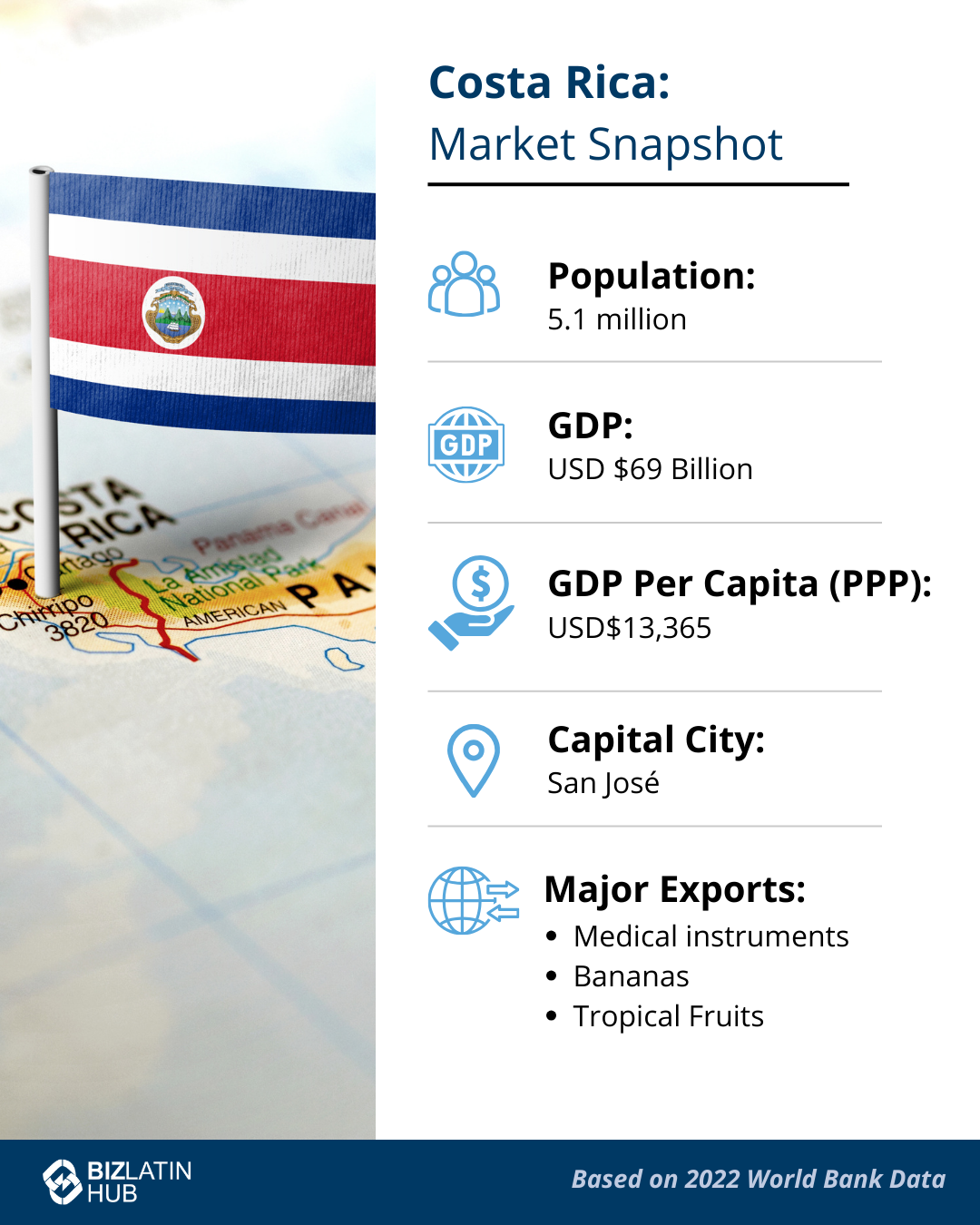
Costa Rica has a strategic geographic location, with ease of access to markets in North and South America.
It is also a safe country, with some of the lowest crime and violence statistics in Latin America and the Caribbean.
Moreover, the country has a booming tourism sector which accounts for nearly 6 percent of the country’s total Gross Domestic Product (GDP), meaning it is set up to cater to foreigners and has one of the highest levels of English proficiency in the region. Other major sectors of the economy include medical supply, agriculture, and IT services.
Costa Rica’s economy has shown consistent growth over recent years, with GDP increasing by close to 3 percent annually during the past decade, prior to the COVID-19 pandemic. The country also maintains a favorable tax regime for foreigners, based on the principle of territoriality, meaning you will not be taxed on earnings generated outside Costa Rica.
The country maintains strong trading links with the United States and is also part of the Dominican Republic-Central America Free Trade Agreement (CAFTA-DR) along with the United States, El Salvador, Guatemala, Honduras, and Nicaragua.
Interested in obtaining your Costa Rican investor visa?
At Biz Latin Hub, we provide a full range of back-office support services to help in your expansion into Costa Rica. As well as visa processing, our multilingual team of legal and accounting specialists can assist you with company incorporation, recruitment, due diligence, and tax advice in Costa Rica.
Contact us for more information about commercial opportunities in Costa Rica.
Learn more about our team and expert authors.

